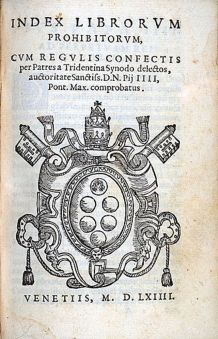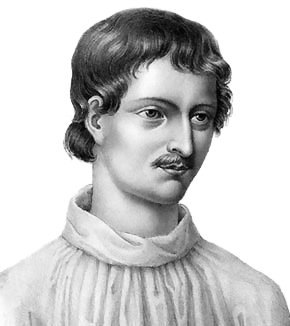 Today, I want to tell you a bit about the Index Librorum Prohibitorum. This is a book that was first produced by the Catholic Church in 1557. It was a list of prohibited books which were considered heretical, anti-clerical or lascivious. The concern was, that these books could damage the morals or beliefs of the faithful. One might question the wisdom of gathering all the titles of books you didn’t want anyone to read, making a big list and then publishing it. But the Catholic Church was pretty powerful. The list grew and changed over more than four hundred years, but on this day in 1966 it was finally, officially abandoned.
Today, I want to tell you a bit about the Index Librorum Prohibitorum. This is a book that was first produced by the Catholic Church in 1557. It was a list of prohibited books which were considered heretical, anti-clerical or lascivious. The concern was, that these books could damage the morals or beliefs of the faithful. One might question the wisdom of gathering all the titles of books you didn’t want anyone to read, making a big list and then publishing it. But the Catholic Church was pretty powerful. The list grew and changed over more than four hundred years, but on this day in 1966 it was finally, officially abandoned.
Before the invention of printing, a book had been a rare and precious object, as everything had to be written out by hand. Scribes were few and far between and mainly worked in monasteries. In any case, a single manuscript rarely caused much of a problem. So censorship wasn’t really necessary. Then, around 1440, Johannes Gutenburg had his idea for a printing press with moveable type. Suddenly books could be mass produced and widely disseminated. The Church wasn’t keen on that idea. There were even certain translations of the Bible that they didn’t want people to have. But a book might have anything in it, and they didn’t like that at all. Ideas and information could be spread quickly using this new, revolutionary technology and they needed some sort of control to prevent the spread of heresies.
On the list of prohibited books we find Galileo Galilei and John Milton alongside Casanova and the Marquis de Sade. It’s an odd list but it reflects the concerns of the Church. One of the things they really didn’t like was the idea that the earth was not at the centre of the universe. Galileo and Nicolaus Copernicus were forgiven in 1718, long after they were both dead. Poor Galileo had spent the last nine years of his life under house arrest for his work. It is likely that printing restrictions acted as a barrier to progress in many fields of study.
The list could prohibit individual titles, or it could ban the author’s complete work, referred to as ‘opera omnia’. It is a huge list that, by the time it was abandoned, contained over four thousand titles, so I couldn’t look at all of them. But I did find one author whose opera omnia was banned in 1600 and still banned in 1966. Even the Marquis de Sade only got a couple of titles on the list, so I wondered what was wrong with him. His name was Giordano Bruno and, in 1600, he was burned at the stake.
Bruno, like Copernicus and Galileo, did not believe that the sun orbited the earth. But he went further than that. He was certain that every star in the sky was another sun, with other planets orbiting them. And that those planets could support life in, just as ours does. In 1584, during a stay in England, he wrote a book about it called: ‘De l’Infinito, Universo e Mondi’, On the Infinite, Universe and Worlds, This did not sit at all well with the Catholic faith. They didn’t like the idea that God might have an infinite number of other worlds to look after.
 Giordano Bruno doesn’t have a birthday. I do know what day he died, but as I don’t want to celebrate that, I thought I’d tell you about him today. He was once ordained as a priest, and spent eleven years in the monastic system before he went rogue. Then someone found a banned book, a work by Erasmus, in a toilet with his writing in it and he had to leave. He then spent the next sixteen years travelling Europe, causing trouble pretty much everywhere he went with his radical ideas. He couldn’t help himself from telling people that he didn’t think that Mary, the mother of Jesus was really a virgin, that Jesus was not the Son of God, but just a top class conjurer and that God would one day forgive the Devil. He was also terribly interested in magic, which didn’t help his case much.
Giordano Bruno doesn’t have a birthday. I do know what day he died, but as I don’t want to celebrate that, I thought I’d tell you about him today. He was once ordained as a priest, and spent eleven years in the monastic system before he went rogue. Then someone found a banned book, a work by Erasmus, in a toilet with his writing in it and he had to leave. He then spent the next sixteen years travelling Europe, causing trouble pretty much everywhere he went with his radical ideas. He couldn’t help himself from telling people that he didn’t think that Mary, the mother of Jesus was really a virgin, that Jesus was not the Son of God, but just a top class conjurer and that God would one day forgive the Devil. He was also terribly interested in magic, which didn’t help his case much.
Bruno delivered a series of lectures in Paris in the early 1580s, but what people found really interesting about them was his amazing memory. This drew the interest of the King Henry III and he was summoned to court, The king needed to know if he was using some kind of sorcery but he explained that he was using organised knowledge, a kind of mnemonic. Whilst in Paris he was able to publish several books on the art of memory. One of them: ‘The Shadow of Ideas’ was dedicated to the king. He also wrote a play: ‘The Torchbearer’ which was pretty scathing about monastic life.
He was arrested when he recklessly returned to Italy and was eventually taken to Rome, where he languished in a tower for six years. Bruno was sentenced to death because he refused to renounce his convictions. As well as his belief in other worlds and all the upsetting stuff he had to say about Jesus, he believed that God was everywhere all the time, so people didn’t need to shut themselves up in monasteries. So that’s why all of his work remained on the ‘banned’ list for three hundred and sixty-six years. The church were still defending their decision to burn him in the year 2000.
So I thought I’d finish up today with a quote from one of his, now unforbidden, works:
“There is one simple Divinity found in all things, one fecund Nature, preserving mother of the universe insofar as she diversely communicates herself, casts her light into diverse subjects, and assumes various names.”
One thought on “Unforbidden”